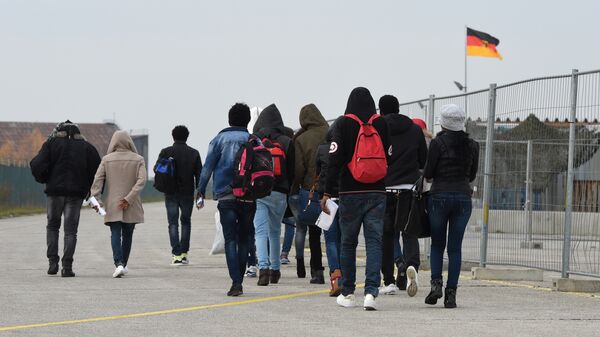Martin Sichert, a member of the German Parliament and chairman of the AfD party in Bavaria, said that criticism of the proposed immigration law is 'well justified'.
Sputnik: Angela Merkel's proposed immigration law has attracted plenty of criticism following its announcement. How justified is this?
Martin Sichert: The critics on the proposed immigration law are very well justified. In my view there are two central areas of the social welfare system of Germany at stake here. Firstly, the so-called priority check ("Vorrangprüfung") will be abolished with the new law. This priority check is intended as a security measure and basically means that job vacancies are to be filled by German and/or EU-citizens first before they are offered to others. In practice, this change means that the competition in the labour market will be intensified — especially for job positions that require low qualifications. This would institute an overall wage dumping of mass proportions on the labour market in Germany. Secondly, the intertwining of asylum and regular migration is simply wrong and de facto abolishes the asylum law.
The proposed law gives everyone a right to change their application status ("Spurwechsel") from asylum seeker to regular migrant. The openness of the law also allows basically anyone, even those who are completely unqualified, to pursue their dreams and do apprenticeship sin Germany. In other words, we are inviting "everyone" and mainly the poor of the world to us, no questions asked.
READ MORE: German Government Unveils Reworked Immigration Law, Faces Onslaught of Critics
Sputnik In your view, how could this further escalate the dispute over the matter in the German Parliament?
Martin Sichert: The proposed immigration law is, based on the points I mentioned above, clearly not in the interest of the German people. Yet all the other political parties are united in the main goal of wanting to attract more and more people, some even stating that the proposed laws are insufficient in terms of attracting more and more people. Every time a Government does something which is against the interest of the people and is also not wanted by a large group of people, this creates tensions. These tensions do not exist only in the halls of the parliament but also outside, on the streets.
Sputnik: We have seen that the German business community has become more concerned about the lack of qualified IT specialists, engineers and shortfalls in other professions in Germany. In your view, what are the key reasons for this problem?
Martin Sichert: The main reason, as I see it, are the high taxes and social security contributions. Combined with the bureaucracy — for which we are famously known for in Germany — this creates a harsh environment especially for highly skilled and qualified persons who are then often tempted to emigrate, since they can earn more and are much more free of the burden of bureaucracy elsewhere. The proposed immigration laws will only intensify this problem. All this immigration of poorer, unqualified and unskilled persons will have to be financed somehow. We have currently hundreds of thousands of highly skilled and qualified persons leaving Germany every year. This number is bound to rise with the proposed new law.
Martin Sichert: We need a new approach. The high tax and social contribution burden of highly skilled and qualified persons needs to be reduced substantially. The same goes for the high burden with bureaucracy — especially for start-ups and self-employed professionals. This however cannot be done if at the same time we are sending out a signal of attracting the poor into our social welfare system.
Sputnik: What needs to be done to improve immigration law, to ensure the flow of qualified specialists on the one hand, and to limit refugees on the other?
Martin Sichert: Firstly, we need actual border controls. We need to be able to manage the flow on our borders and clearly define who can or cannot come to us. This also means a consistent application of our existing asylum laws — meaning that there is a no-tolerance policy in place for those whose asylum claims have been denied. These people need to be deported immediately. We also need an immigration law based on a point-based system like many other immigration countries already have — a system that is open for skilled workers and gives zero chance to immigration of poor people in our welfare systems. The best way to attract these workers is however, as I already stated before, by lowering the tax and social contribution burdens, remove the bureaucratic barriers and to invest in our infrastructure — especially in digital infrastructure.
The views expressed in this article are those of the author and do not necessarily reflect the position of Sputnik.





